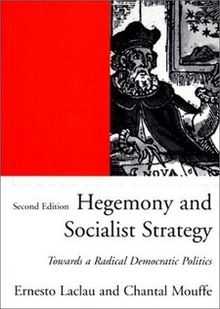Hegemony and Socialist Strategy
 Cover to the 2nd Edition | |
| Author | Chantal Mouffe and Ernesto Laclau |
|---|---|
| Country | United Kingdom |
| Language | English |
| Genre | Political Theory |
| Publisher | Verso (New Left) |
Publication date | 1985 |
| Media type | Print (hardcover and paperback) |
| Pages | 197 (first edition) |
| ISBN | 0860910679 (Verso) |
| OCLC | 67440480 |
Written in English in 1985 by Ernesto Laclau and Chantal Mouffe, Hegemony and Socialist Strategy is a work of political theory in the post-Marxist tradition. Developing several sharp divergences from the tenets of canonical Marxist thought, the authors begin by tracing historically varied discursive constitutions of class, political identity, and social self-understanding, and then tie these to the contemporary importance of hegemony as a destabilized analytic which avoids the traps of various procedures Mouffe and Laclau feel constitute a foundational flaw in Marxist thought: essentializations of class identity, the use of a priori interpretative paradigms with respect to history and contextualization, the privileging of the base/superstructure binary above other explicative models.
Organization
The book is divided into four chapters (~50 pages each). The first two chapters deal with conceptual developments in the manner of an intellectual history, albeit with much more of an eye to disputation and intervention than traditional intellectual history employs. Specifically, Chapter 1 discusses the work of Rosa Luxemburg, Karl Kautsky, Eduard Bernstein, and Georges Sorel (among other texts by major thinkers in the Marxist tradition). Chapter 2's discussion of Gramsci's conception of cultural hegemony is followed by Chapter 3's more politicized development of Laclau and Mouffe's own arguments regarding hegemony's character and constitution. Finally, the fourth chapter argues for the relevance of hegemony as an analytic for the understanding and governance of contemporary politics, political engagement, and self-understanding on the Left.
Contents
Introduction
1. Hegemony: The Genealogy of a Concept
- The Dilemmas of Rosa Luxembourg
- Crisis, Degree Zero
- The First Response to the Crisis: the Formation of Marxist Orthodoxy
- The Second Response to the Crisis: Revisionism
- The Third Response to the Crisis: Revolutionary Syndicalism
2. Hegemony: The Difficult Emergence of a New Political Logic
- Combined Logic and the Logic of the Contingent
- 'Class Alliances': Between Democracy and Authoritarianism
- The Gramscian Watershed
- The Last Redoubt of Essentialism: The Economy
- Facing the Consequences
3. Beyond the Positivity of the Social: Antagonisms and Hegemony
- Social Formation and Overdetermination
- Articulation and Discourse
- The Category of 'Subject'
- Antagonism and Objectivity
- Equivalence and Difference
- Hegemony
4. Hegemony and Radical Democracy
- The Democratic Revolution
- Democratic Revolution and New Antagonisms
- The Anti-Democratic Offensive
- Radical democracy: Alternative for a New Left
Reception
Hegemony and Socialist Strategy was greeted with positive reviews and has become a reference point in its field; for example, Marxist philosopher Slavoj Žižek cited Hegemony and Socialist Strategy as a work having had an impact on his book, The Sublime Object of Ideology.[1] Furthermore, its resolutely "post-Marxist" self-definition marks it as one of the first major texts associated with this disciplinary development. A new edition was published in 2001, which included a preface by the authors in which they reaffirmed their commitment to the arguments made in 1985.
References
- ↑ Butler, Rex. "Slavoj Zizek: What is a Master-Signifier". lacan.com. Retrieved 30 June 2010.